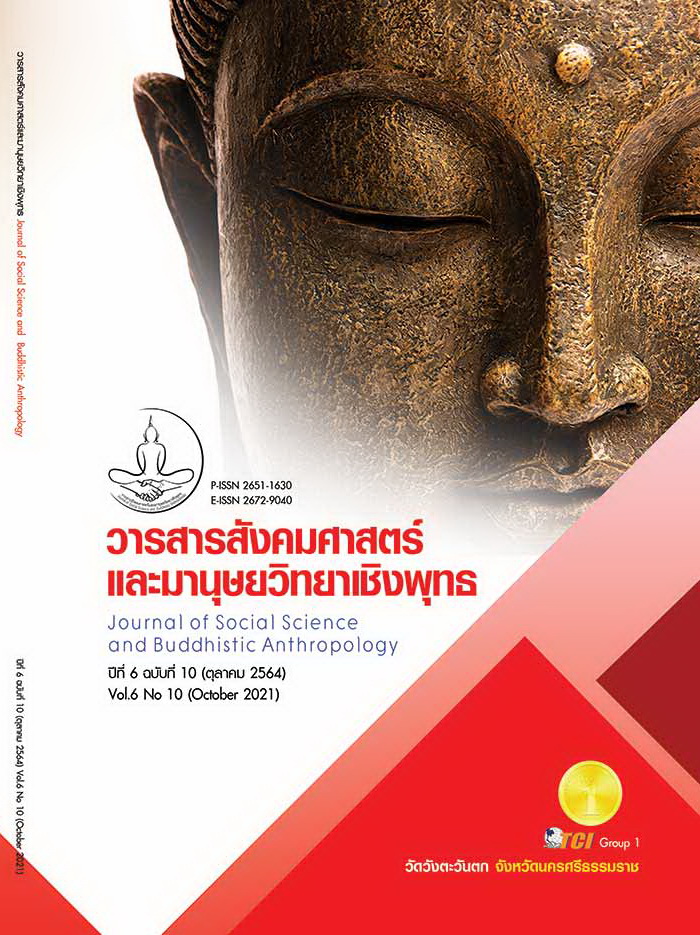LEARNING ORGANIZATION OF MANAGEMENT AND INNOVATION MODEL TO CREATE FOR SUSTAINABILITY COMMUNITY ENTERPRISE: HERBAL GROUP IN THE NORTHEAST REGION
Keywords:
Management, Innovation, Knowledge Management, SustainabilityAbstract
The objectives of this research article were to: 1) explore how three factors consisted of management, innovation, and knowledge management influence the Learning Organization of Management and Innovation Model to create for Sustainability Community Enterprise: Herbal group in the Northeast Region and 2) present the appropriate model for herbal group community enterprise. Theoretical reviews and content analysis were a mixed research method from in-depth interviews (Qualitative Research) with twenty expert persons and focus group with herbal group community enterprises. The questionnaires (Quantitative Research) were sent to two hundred and seventy persons of herbal group community enterprises. This research statistics used were the percentage, mean, standard deviation and Structural Equation Model (SEM) was used for data analysis. Findings revealed that the overall of management factors were at high level which the coordinating was the maximum average. The overall of innovation factors were at high level which the marketing innovation was the maximum average. The overall of knowledge management factors were at high level which the learning was the maximum average and the overall of sustainability was at high level which the society was the maximum average. Furthermore, the results of the conformity test of the theoretical and the empirical model found that it is a good level. The research result lead to MIKS MODEL that consists of Management, Innovation, Knowledge Management, and Sustainability. The herbal group and other community enterprises are able to apply MIKS MODEL appropriately for successful and sustainability community enterprises.
References
กรมส่งเสริมการเกษตร. (2562). รายชื่อวิสาหกิจชุมชน/เครือข่ายวิสาหกิจชุมชน. เรียกใช้เมื่อ 9 เมษายน 2562 จาก http://smce.doae.go.th/ProductCategory/SmceCategory.php
กระทรวงสาธารณสุข และองค์กรภาครัฐ-เอกชน. (2559). แผนแม่บทแห่งชาติ ว่าด้วยการพัฒนาสมุนไพรไทย ฉบับที่ 1 พ.ศ. 2560 - 2564. (พิมพ์ครั้งที่ 1). กรุงเทพมหานคร: ทีเอส อินเตอร์พริ้นท์.
กฤตยา สังข์เกษม และคณะ. (2560). นวัตกรรมก็เกิดขึ้นได้ในวิสาหกิจชุมชน: กรณีศึกษาวิสาหกิจชุมชนในภาคใต้. เรียกใช้เมื่อ 15 พฤศจิกายน 2562 จาก https://www.bot.or.th/Thai /MonetaryPolicy/Southern/ResearchPaper/community_enterprise.pdf
คณิดา ไกรสันติ และรัสมนต์ คำศรี. (2559). แนวทางการพัฒนาศักยภาพกลุ่มวิสาหกิจชุมชนสุชาวดี ตำบลปริก อำเภอสะเดา จังหวัดสงขลา. ใน การประชุมหาดใหญ่วิชาการระดับชาติ และนานาชาติ ครั้งที่ 7. มหาวิทยาลัยหาดใหญ่.
จิรประภา อัครบวร เเละคณะ . (2552). การจัดการความรู้ = Knowledge management. (พิมพ์ครั้งที่ 3). กรุงเทพมหานคร: สำนักงานคณะกรรมการพัฒนาระบบราชการ.
ชาญยุทธ์ ภานุทัต. (2551). แนวทางในการตัดสินใจเลือกเพาะเห็ด. กรุงเทพมหานคร: สมาคมนักวิจัยและเพาะเห็ดแห่งประเทศไทย.
ณรงค์ โพธิพฤกษานันท์. (2560). การจัดการความรู้ภูมิปัญญาท้องถิ่นในการนำสมุนไพรมาใช้ตามแนวปรัชญาเศรษฐกิจพอเพียง กรณีศึกษาในเขตจังหวัดนนทบุรี. ใน การประชุมวิชาการนานาชาติมหาวิทยาลัยเทคโนโลยีราชมงคล ครั้งที่ 8. ศูนย์แสดงสินค้าและการประชุม อิมแพ็ค เมืองทองธานี.
ธนัณชัย สิงห์มาตย์. (2558). ศักยภาพการแข่งขันวิสาหกิจชุมชน: กรณีศึกษากลุ่มจังหวัดร้อยแก่นสารสินธุ์. ใน ดุษฎีนิพนธ์บริหารธุรกิจดุษฎีบัณฑิต สาขาวิชาการบริหารธุรกิจ. มหาวิทยาลัยนเรศวร.
ธนิดา ผาติเสนะ เเละคณะ. (2561). การจัดการความรู้ภูมิปัญญาหมอชาวบ้านเพื่อการดูแลสุขภาพแบบองค์รวม: กรณีศึกษา เมืองนาทรายทอง นครหลวงเวียงจันทน์ สาธารณรัฐประชาธิปไตยประชาชนลาว. ใน รายงานการวิจัย. กรุงเทพมหานคร: กรมส่งเสริมวัฒนธรรม กระทรวงวัฒนธรรม.
บุญสม ลีชยากิตติกร. (2558). นวัตกรรมการตลาดสำหรับผลิตภัณฑ์สมุนไพร. ใน วิทยานิพนธ์วิทยาศาสตรมหาบัณฑิต สาขาวิชาการบริหารเทคโนโลยี. มหาวิทยาลัยธรรมศาสตร์.
พยอม วงศ์สารศรี. (2552). การจัดการทรัพยากรมนุษย์. (พิมพ์ครั้งที่ 5). กรุงเทพมหานคร: มหาวิทยาราชภัฏสวนดุสิต.
ไพบูลย์ ปิลันธน์โอวาท และเทิดศักดิ์ โรจน์สุรกิตติ. (2560). รูปแบบความยั่งยืนของธุรกิจค้าปลีก สำหรับวิสาหกิจชุมชนสมุนไพรในประเทศไทย. วารสารสังคมศาสตร์บูรณาการ มหาวิทยาลัยมหิดล, 4(2), 277-301.
ฤทัยภัทร ให้ศิริกุล. (2563). แนวทางการบริการจัดการกลุ่มวิสาหกิจชุมชนสมุนไพรบ้านบัว ตำบลบ้านบัว อำเภอเมือง จังหวัดบุรีรัมย์. วารสารวิจัยและพัฒนา มหาวิทยาลัยราชภัฏบุรีรัมย์, 15(1), 9-23.
ลักษณะเลิศ เปรมปรีดิ์. (2560). สมุนไพรไทย: ภูมิปัญญาไทยสู่การสร้างมูลค่าทางเศรษฐกิจ. วารสารสนค., 7(66), 4-5.
อุสา สุทธิสาคร. (2554). การเรียนรู้และการจัดการความรู้ด้านวิสาหกิจชุมชนของบ้านร่องก่อ ตำบลโพธิ์ใหญ่ อำเภอวารินชำราบ จังหวัดอุบลราชธานี. กรุงเทพมหานคร: มหาวิทยาลัยหอการค้าไทย.
Best, J. W. (1970). Research in education. Englewood Cliffs. NJ: Prentice-Hall.
Cronbach, L. J. (1990). Essentials of Psychology Testing. (5th ed). New York: Harper Collins Publishers Inc.
Hair, J. F. et al. (2010). Multivariate Data Analysis. (7th ed). New York: Pearson Education Inc.
Stan, V & Saporta, G. (2016). Customer Satisfaction and PLS Structural Equation Modeling An Application to Automobile Market. Retrieved July 18, 2020, from http://cedric.cnam.fr/PUBLIS/RC825.pdf
Yamane, T. (1973). Statistics: An Introductory Analysis. (3rded). New York: Harper and Row Publications.









